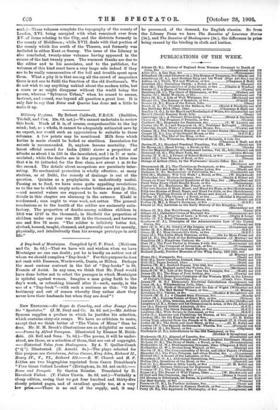Military Hygiene. By Robert Caldwell, F.R.C.S. (Balinese, Tindall, and Cox.
10s. 6d. net.)—We cannot undertake to review this book. Much of it is, of course, comprehensible to the lay mind ; but, as- a whole, it cannot be adequately estimated save by an expert, nor would such an appreciation be suitable to these columns. A few points may be mentioned. Milk from which butter is made should be boiled or sterilised. Inoculation for enteric is recommended. It, anyhow. lessons mortality. The latest official record for India (1901) shows a proportion of attacks as about 1 in 150 in the inoculated, and 1 in 7( of unin- oculated; while the deaths are in the proportion of a little less that 4 in 10 (attacks) for the first class, and about 1 in 10 for the second. The details about mosquitoes are peculiarly inter- eating. No mechanical protection is wholly effective ; at many stations, as at Delhi, the remedy of drainage is out of the question. Quinine as a prophylactic is undoubtedly useful. Passing on to food, we have some quite appalling revelations as to the use to which empty soda-water bottles are put (p. 204), —and aerated waters are supposed to be safe Some of the details in this chapter are alarming in the extreme. Khaki is condemned ; men ought to wear wool, not cotton. The general conclusions as to the health of the soldier are eminently satis- factory. The proportion of deaths among soldiers children in 1902 was 12.97 in the thousand; in Sheffield the proportion of children under one year was 225 in the thousand, and between one and five 75 more. "The soldier is infinitely better fed, clothed, housed, taught, cleansed, and generally cared for morally, physically, and intellectually than his average prototype in civil life."


















































 Previous page
Previous page